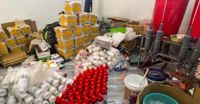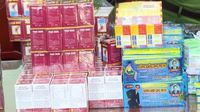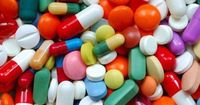In a concerted effort to combat the rampant issue of counterfeit medicines, the Vietnamese government is taking significant steps to strengthen regulations and enforcement measures. The Ministry of Health has proposed amendments to existing laws following a recent directive from the Prime Minister aimed at tackling the production and sale of fake medicines and health products.
The Prime Minister's Official Telegram No. 41/CD-TTg outlines the urgent need for collaboration among various governmental bodies, including the Ministry of Public Security and the Ministry of Industry and Trade, to enhance control over counterfeit medicines circulating in the market. This initiative comes amid growing concerns about the public's health and safety as counterfeit drugs become increasingly sophisticated and prevalent.
Dr. Ta Manh Hung, Deputy Director of the Drug Administration under the Ministry of Health, emphasized the importance of these measures during a recent press conference. "We are advising the government to issue a decree regulating online medicine businesses and to establish clear responsibilities for various units within the Ministry of Health regarding the control of drug production and circulation," he stated.
As part of this initiative, the Ministry plans to improve public awareness about counterfeit medicines. This will involve increased communication and coordination with media outlets to disseminate information about the dangers of counterfeit drugs, encouraging citizens to seek medical treatment from licensed facilities rather than self-medicating. The Ministry is also urging the public to report any suspicious activities related to counterfeit medicines.
To bolster enforcement, the Ministry of Health is set to enhance inspection efforts and establish inter-agency teams focused on counterfeit prevention. This includes improving data systems related to the pharmaceutical industry, making information about licensed medicines publicly accessible, and ensuring that consumers can easily verify the legitimacy of the products they purchase.
In a related effort, the Ministry is reviewing Decree No. 117/2020/ND-CP, which governs administrative violations in the health sector, with the aim of imposing stricter penalties for those involved in the trade of counterfeit medicines. This includes individuals and organizations that sell medicines without proper licenses or those who operate online without regulation.
According to a representative from the Drug Administration, consistent market inspections have revealed numerous instances of counterfeit medicines being sold. "We have regularly taken samples for quality control and have discovered several cases of counterfeit production," the representative noted.
These measures come on the heels of a significant crackdown by local authorities. Recently, the Thanh Hoa Provincial Police dismantled a large-scale operation producing counterfeit medicines that had been active for four years. This operation specifically targeted elderly individuals who often self-medicate for common ailments with cheap, unverified medicines.
The criminal group, led by Nguyen Tien Dat, 34, from Hanoi, and Trinh Doan Giao, 40, from Saigon, invested in modern production facilities and used herbs of dubious origin to manufacture counterfeit products. They created their own drug names and company identities to mislead consumers. Police investigations revealed that the group distributed these counterfeit medicines across multiple provinces, including Hanoi, Saigon, Vinh Phuc, Hung Yen, An Giang, and Dong Thap.
Authorities seized nearly 10 tons of counterfeit medicines and raw materials during raids on six locations, leading to the prosecution of 14 individuals involved in the operation. The seized products included 21 types of counterfeit medicines, predominantly targeting bone and joint health, with tens of thousands of packages found.
In another significant case, Bac Giang Provincial Police announced the arrest of Nguyen Van Vinh, 34, who was discovered producing counterfeit plant protection drugs and rat poison. Operating from his home, Vinh had been selling these products through social media, capitalizing on the growing demand for agricultural chemicals.
During a raid on April 16, police found over 7,193 finished products, nearly 20,000 labels, and substantial quantities of raw materials used in the production of these counterfeit drugs. Vinh's operation reportedly generated over 5 billion VND in revenue from approximately 10,700 orders since late 2024.
Authorities have noted that the materials used in Vinh's counterfeit products were largely ineffective, consisting mainly of water mixed with coloring agents and fillers, with no active ingredients capable of providing the claimed benefits.
As these cases illustrate, the fight against counterfeit medicines in Vietnam is far from over. While progress has been made, the Ministry of Health acknowledges that the issue remains pervasive and that ongoing efforts are necessary to ensure public safety. The Ministry's commitment to improving regulations and enforcement, along with public education campaigns, aims to create a safer healthcare environment for all citizens.
In conclusion, the Vietnamese government's proactive approach to combat counterfeit medicines reflects a growing recognition of the serious risks posed by these products. With increased collaboration among various agencies and a focus on public awareness, there is hope for a significant reduction in the prevalence of counterfeit drugs in the market.



